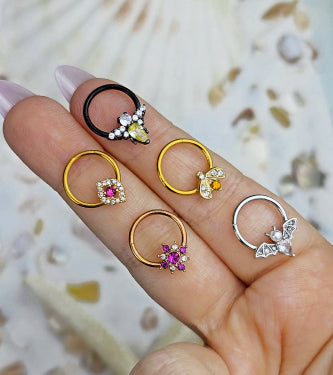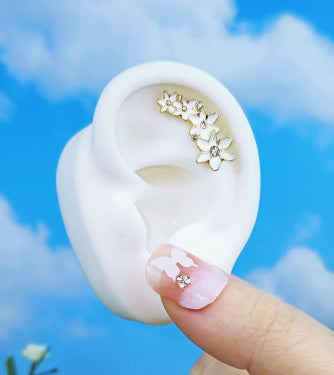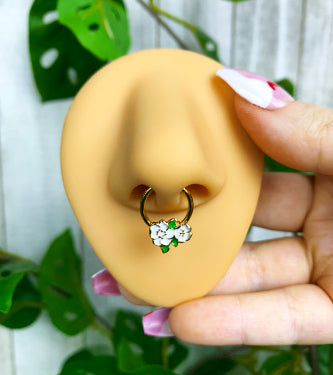Five Things You Should Never Put on Your Piercings
Getting pierced can be quite the experience - some individuals might even think it's fun or therapeutic... But it's often what happens AFTER the piercing procedure that is most important. Nobody wants to experience soreness, an infection, or rejection, and you might think that you should treat your new piercing like any other wound and hit it with a spray or topical cream of some kind.
In actuality, there are several products that you should actively AVOID putting on your piercings. We've compiled them all in this helpful little list.
Disclaimer: Body Candy is only here to give you helpful advice when it comes to healing up your piercing. If you think you are experiencing a medical issue, contact your doctor AND a professional piercer ASAP.
1.) Alcohol
Rubbing alcohol is a common go-to when it comes playground bumps and scrapes, so why wouldn't it work on our piercings? While it's true that alcohol is an effective disinfectant - it should be reserved for "dirty" wounds, like an elbow scrape on the asphalt or a bite from an animal.
Professional piercers work in a sterile environment and pierce with sterile needles and jewelry, so a properly performed piercing is not a "dirty" wound. Alcohol can actually dry out and irritate a fresh piercing. By putting alcohol on your wound, you might actually be introducing the agent that is causing the irritation - causing a feedback loop where you confuse yourself into thinking you have a different issue.
2.) Hydrogen Peroxide
Another tried-and-true method for wound cleaning, most households have a plain brown bottle of H2O2 sitting in one of their medicine cabinets. You may have used it on a scrape or swished your mouth out with it - why shouldn't you put it on your piercings?
Hydrogen peroxide is known for it's "bubbling" action, which has become a hotly-debated issue. While this may (or may not) be cleaning your piercing, H2O2 has a tendency to dry out wounds and can also damage or irritate the issue inside of your piercing. It will easily break up the crusty stuff that tends to form up on the outside of your piercing site, but that is the stuff that's keeping the inside protected and moist, allowing it to heal.
3.) Betadine, Bactine, or anything containing "Triclosan"
Betadine and Bactine, although effective products for their intended uses, are too powerful for piercings and are simply not made to be used as aftercare. Like many of the other items mentioned above, these chemicals have a drying effect on the skin, making them unsuitable for healing.
Triclosan is a common chemical often added to soaps to give them an anti-bacteria property. At the end of the day, all of the ingredients in anti-bacterial soap are tough on the skin. Triclosan is a harsh chemical - it's technically classified as a pesticide by the EPA -
4.) Petroleum Jelly
Yes, vaseline and petroleum jelly products are meant to protect the skin. No, you should not use it on your piercing.
In protecting the skin, you are also creating a barrier. This barrier might effect your piercing in a few different ways... First, it will not allow oxygen to pass through and a healing piercing needs a steady flow of oxygen to effectively continue the healing process. Second, the barrier may actually trap harmful bacteria inside of the piercing, which could cause an infection or worse.
Let your piercings breathe!
5.) Tea Tree Oil
This one comes with a bit of a caveat... Some professionals may recommend this nice-smelling oil, but in general, tea tree oil shouldn't be used on a piercing at all.
Tea Tree oil is an astringent, which means it has a drying effect on your skin. It might be effective at lessening the symptoms of a fluid-filled bump, but it will dry out any healing piercing. Since it is a very concentrated essential oil, you may also inadvertently give yourself a burn after using it. If you are looking for piercing aftercare, a simple saline solution is a much better choice.
SEA SALT SOAKS
For more information about piercing aftercare, check out our blog about creating a warm, saline solution using sea salt.
Add us on Snapchat: bodycandy.com
Add us on TikTok: @bodycandy













